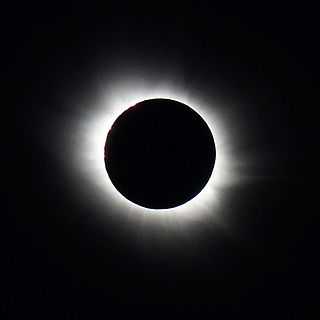Solar eclipse of July 1, 2000
| Solar eclipse of July 1, 2000 | |
|---|---|
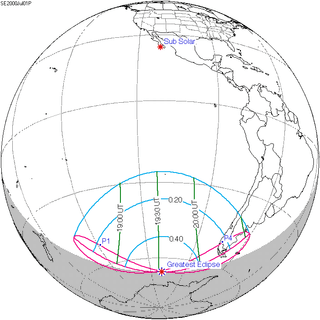 Map | |
| Type of eclipse | |
| Nature | Partial |
| Gamma | -1.2821 |
| Magnitude | 0.4768 |
| Maximum eclipse | |
| Coordinates | 66°54′S 109°30′W / 66.9°S 109.5°W |
| Times (UTC) | |
| Greatest eclipse | 19:33:34 |
| References | |
| Saros | 117 (68 of 71) |
| Catalog # (SE5000) | 9509 |
A partial solar eclipse occurred on July 1, 2000. A solar eclipse occurs when the Moon passes between Earth and the Sun, thereby totally or partly obscuring the image of the Sun for a viewer on Earth. A partial solar eclipse occurs in the polar regions of the Earth when the center of the Moon's shadow misses the Earth. This eclipse occurred near the south pole, and was visible from the southern tip of South America at sunset.
Images
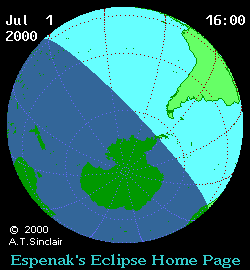
Related eclipses
Solar eclipses 2000-2003
Each member in a semester series of solar eclipses repeats approximately every 177 days and 4 hours (a semester) at alternating nodes of the Moon's orbit.
Note: Partial solar eclipses on February 5, 2000 and July 31, 2000 occur in the previous lunar year set.
| Ascending node | Descending node | |||
|---|---|---|---|---|
| Saros | Map | Saros | Map | |
| 117 | July 1, 2000 Partial (south) |
122 | December 25, 2000 Partial (north) | |
127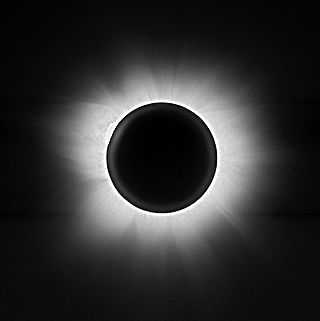 Totality from Zambia | June 21, 2001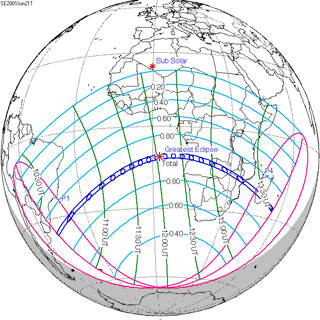 Total |
132 Partial from Minneapolis, MN | December 14, 2001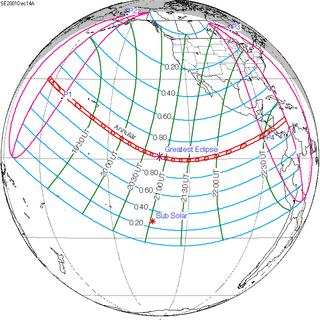 Annular | |
137.jpg) Partial Los Angeles, CA | June 10, 2002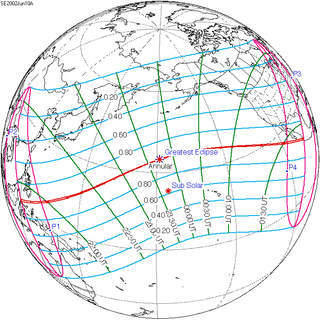 Annular |
142 | December 4, 2002 Total | |
147 Partial from Belfort | May 31, 2003 Annular |
152 | November 23, 2003 Total | |
Metonic series
The metonic series repeats eclipses every 19 years (6939.69 days), lasting about 5 cycles. Eclipses occur in nearly the same calendar date. In addition the octon subseries repeats 1/5 of that or every 3.8 years (1387.94 days).
This series has 21 eclipse events, progressing from north to south between July 1, 2000 and July 1, 2076.
| July 1-2 | April 19-20 | February 5-7 | November 24-25 | September 12-13 |
|---|---|---|---|---|
| 117 | 119 | 121 | 123 | 125 |
 July 1, 2000 |
 April 19, 2004 |
 February 7, 2008 |
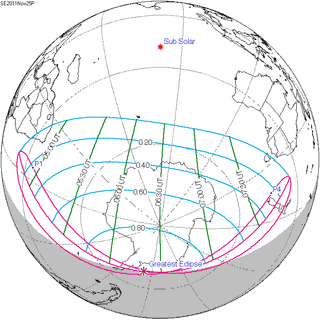 November 25, 2011 |
 September 13, 2015 |
| 127 | 129 | 131 | 133 | 135 |
 July 2, 2019 |
 April 20, 2023 |
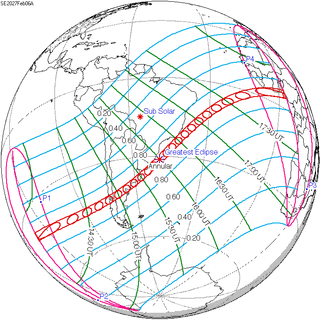 February 6, 2027 |
 November 25, 2030 |
 September 12, 2034 |
| 137 | 139 | 141 | 143 | 145 |
 July 2, 2038 |
 April 20, 2042 |
 February 5, 2046 |
 November 25, 2049 |
 September 12, 2053 |
| 147 | 149 | 151 | 153 | 155 |
 July 1, 2057 |
 April 20, 2061 |
 February 5, 2065 |
 November 24, 2068 |
 September 12, 2072 |
| 157 | ||||
 July 1, 2076 |
References
| Wikimedia Commons has media related to Solar eclipse of 2000 July 1. |
External links
- Earth visibility chart and eclipse statistics Eclipse Predictions by Fred Espenak, NASA/GSFC
